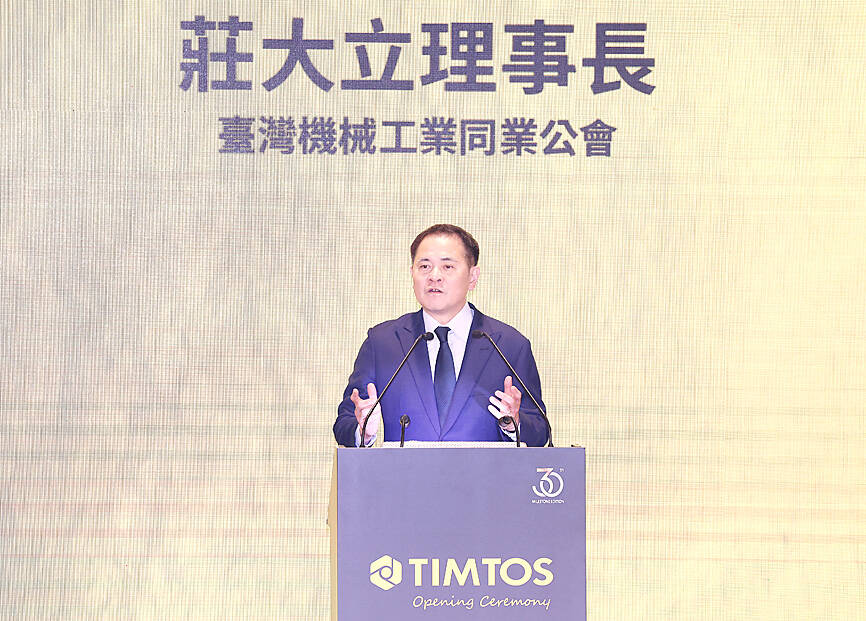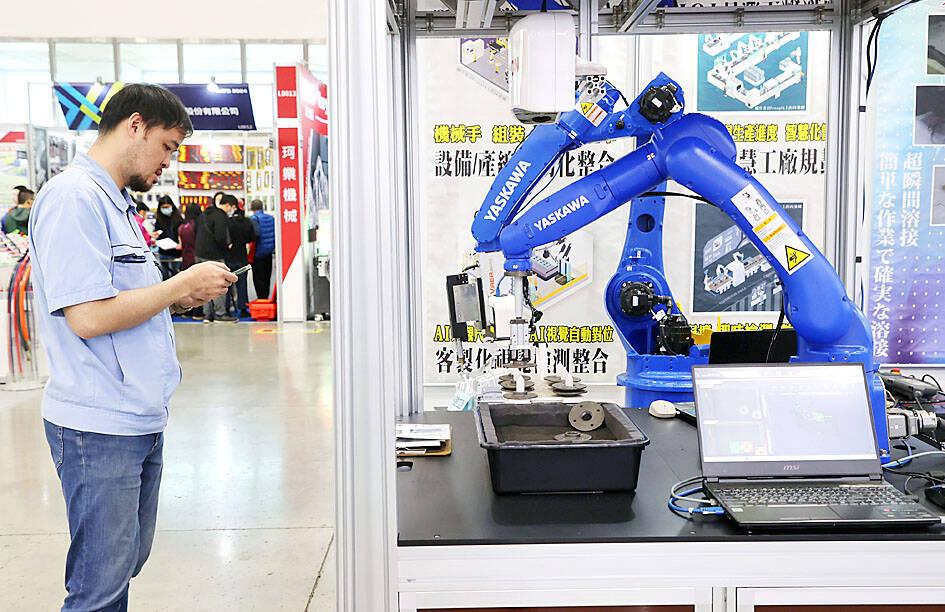Taiwan’s machinery industry is bracing for a sharp fall in exports as hefty US tariffs would interrupt local manufacturers’ sales to their biggest overseas market, the Taiwan Association of Machinery Industry (TAMI, 台灣機械公會) said yesterday.
US President Donald Trump on Wednesday announced a 32 percent reciprocal tariff on Taiwanese goods, which exceeded expectations, TAMI chairman David Chuang (莊大立) told the Chinese-language Liberty Times (the Taipei Times’ sister newspaper) yesterday.
The levy on Taiwanese imports is also higher than the tariffs imposed on goods from major rivals Japan, South Korea and the EU at 24 percent, 25 percent and 20 percent respectively, Chuang said.

Photo: Chen Yi-kuan, Taipei Times
Even China, which mainly produces low-end, standard products, received a 34 percent tariff, only 2 percentage points higher than Taiwan, he said.
“The tariff is quite severe and will deal a serious blow to Taiwan’s machinery industry,” Chuang said.
“It will affect customers’ willingness to buy Taiwan’s products. It will also be difficult for the industry to achieve the 5 to 10 percent growth goal in exports this year,” he added.

Photo: CNA
The US last year replaced China as Taiwan’s largest machinery export market, with shipments valued at US$7.19 billion, accounting for 24.6 percent of the nation’s total machinery exports, association data showed.
In the first two months of this year, the US remained the largest buyer of Taiwanese machinery products at US$1.19 billion, accounting for 27.2 percent of the nation’s total exports, the data showed.
The local industry has already been hit in recent years by geopolitical conflicts, the sharp depreciation of the yen and the dumping of low-priced goods from China in overseas markets.
As the tariffs on major competitors are lower than Taiwan’s, coupled with the lack of a free-trade deal with the US, the pressure on local manufacturers is big, Chuang said.
The association has scheduled a board of directors’ meeting on Thursday next week to discuss how the industry could respond to the heavy US tariffs, Chuang said.
Representatives from the International Trade Administration and the Industrial Department Administration would be invited to discuss the matter, he said.
The association also expects the Ministry of Economic Affairs and other government agencies to further communicate with the US government to look for potential tariff exemptions or cuts, he added.
The Taiwan Machine Tool & Accessory Builders' Association (TMBA, 台灣工具機暨零組件公會) yesterday also said the new US tariffs would pose severe challenges to local manufacturers.
Last year, the US was Taiwan's second-largest market for machine tool exports, accounting for about 15 percent of the nation's total machine tool exports, while shipments of key components to the US accounted for about 7 percent of the total, the association said in a separate statement, adding that the hefty tariffs are bound to affect local makers' exports to the US market.
In addition, the association expressed concerns that the US tariffs would especially hit small and medium-sized machine tool and components makers, which are the backbone of the local industry, according to the statement.
The Taipei-based Chinese National Association of Industry and Commerce (CNAIC, 工商協進會) yesterday called on the government to immediately activate its crisis response mechanism, conduct a comprehensive review of the potential impacts, and enact necessary measures to support local industries as soon as possible.
In addition, Taiwan must strive for more communication with the US and consider more purchases from the US and more investments there, the CNAIC said in a release.
The government should also provide assistance to affected industries, help accelerate industrial upgrading and market diversification, and improve Taiwan’s international cooperation, it added.

With an approval rating of just two percent, Peruvian President Dina Boluarte might be the world’s most unpopular leader, according to pollsters. Protests greeted her rise to power 29 months ago, and have marked her entire term — joined by assorted scandals, investigations, controversies and a surge in gang violence. The 63-year-old is the target of a dozen probes, including for her alleged failure to declare gifts of luxury jewels and watches, a scandal inevitably dubbed “Rolexgate.” She is also under the microscope for a two-week undeclared absence for nose surgery — which she insists was medical, not cosmetic — and is

CAUTIOUS RECOVERY: While the manufacturing sector returned to growth amid the US-China trade truce, firms remain wary as uncertainty clouds the outlook, the CIER said The local manufacturing sector returned to expansion last month, as the official purchasing managers’ index (PMI) rose 2.1 points to 51.0, driven by a temporary easing in US-China trade tensions, the Chung-Hua Institution for Economic Research (CIER, 中華經濟研究院) said yesterday. The PMI gauges the health of the manufacturing industry, with readings above 50 indicating expansion and those below 50 signaling contraction. “Firms are not as pessimistic as they were in April, but they remain far from optimistic,” CIER president Lien Hsien-ming (連賢明) said at a news conference. The full impact of US tariff decisions is unlikely to become clear until later this month

GROWING CONCERN: Some senior Trump administration officials opposed the UAE expansion over fears that another TSMC project could jeopardize its US investment Taiwan Semiconductor Manufacturing Co (TSMC, 台積電) is evaluating building an advanced production facility in the United Arab Emirates (UAE) and has discussed the possibility with officials in US President Donald Trump’s administration, people familiar with the matter said, in a potentially major bet on the Middle East that would only come to fruition with Washington’s approval. The company has had multiple meetings in the past few months with US Special Envoy to the Middle East Steve Witkoff and officials from MGX, an influential investment vehicle overseen by the UAE president’s brother, the people said. The conversations are a continuation of talks that

CHIP DUTIES: TSMC said it voiced its concerns to Washington about tariffs, telling the US commerce department that it wants ‘fair treatment’ to protect its competitiveness Taiwan Semiconductor Manufacturing Co (TSMC, 台積電) yesterday reiterated robust business prospects for this year as strong artificial intelligence (AI) chip demand from Nvidia Corp and other customers would absorb the impacts of US tariffs. “The impact of tariffs would be indirect, as the custom tax is the importers’ responsibility, not the exporters,” TSMC chairman and chief executive officer C.C. Wei (魏哲家) said at the chipmaker’s annual shareholders’ meeting in Hsinchu City. TSMC’s business could be affected if people become reluctant to buy electronics due to inflated prices, Wei said. In addition, the chipmaker has voiced its concern to the US Department of Commerce